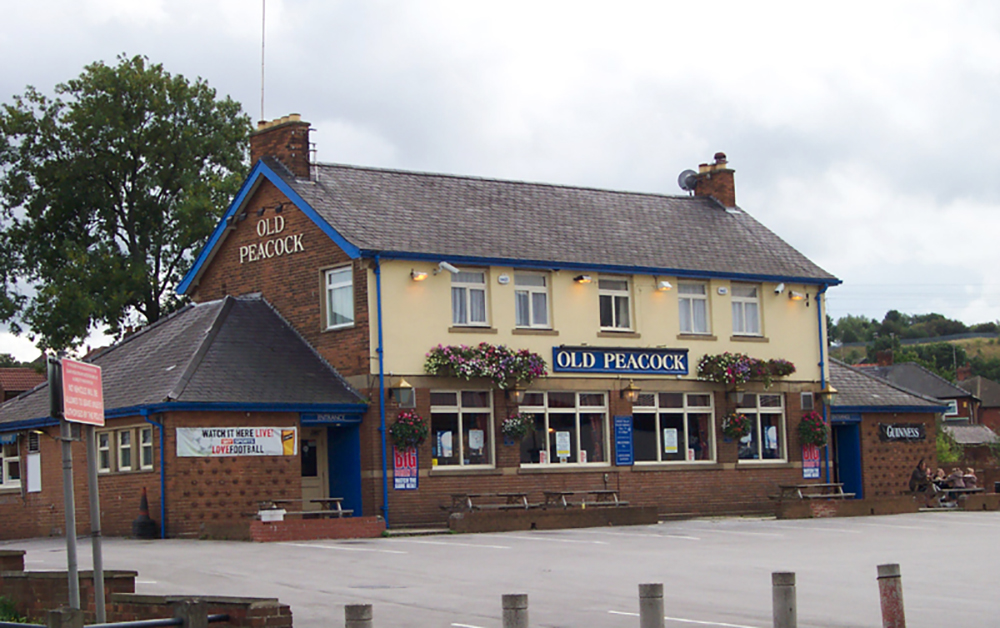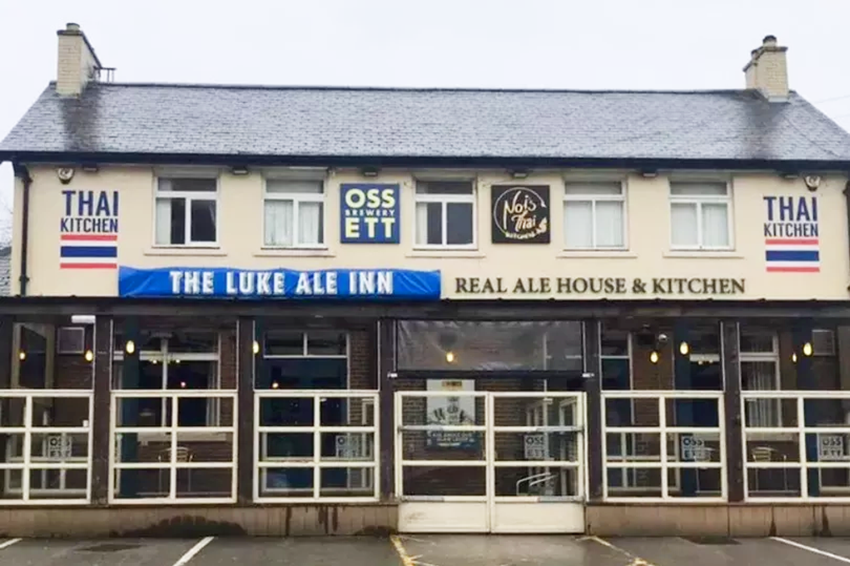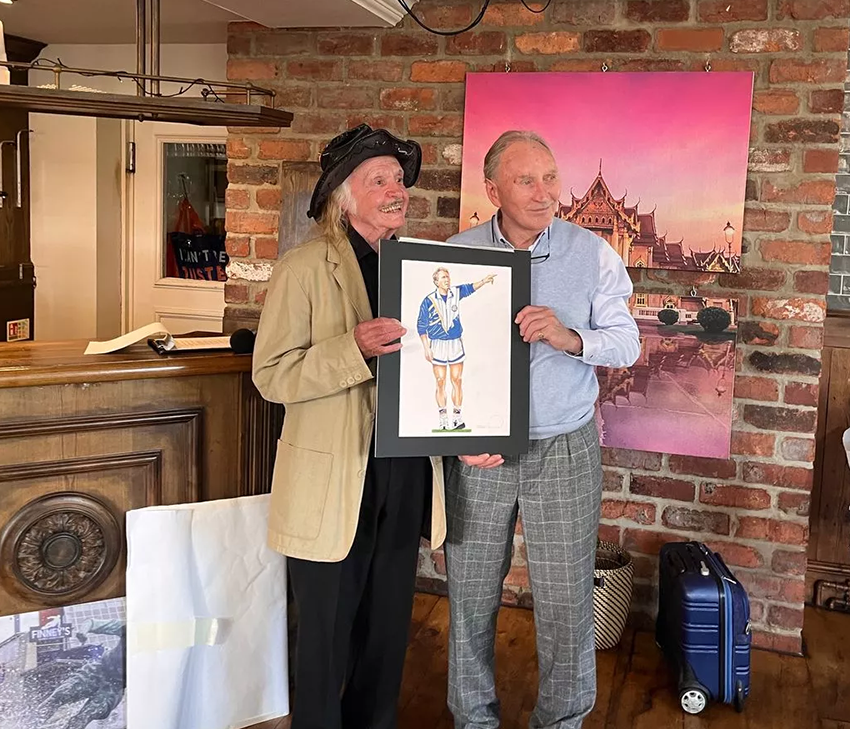 |
 |
 |
Miscellaneous
The Old Peacock — Far more than a public house — August 2025
Confusion still lingers over when the Old Peacock became 'old'. For many
years only one Peacock is recorded in directories, but by 1842 there was
also a 'New Peacock' further down Elland Road. To distinguish the two,
the original house eventually took on the name by which it has been fondly
known for nearly two centuries. Its early landlords included characters
who often combined the trade of innkeeping with cattle dealing, and its
location shifted in the records from Beeston to Islington and later to
Holbeck, reflecting how the city boundaries blurred as the area grew with
pits, works, terraces and eventually sporting grounds. The pub's name itself has fuelled debate. Some suggest it was linked
to the nearby Peacock Pit colliery, though the pub appears in records
before the pit does, making it just as likely that the mine borrowed its
name from the pub, or from a local family called Peacock, a common Leeds
surname at the time. Whatever the truth, the name proved enduring, and
in time it came to symbolise something much bigger than anyone in 1826
could have imagined. That transformation began in 1878 when Bentley's Brewery, owners of the
Old Peacock, developed the land across the road into the Old Peacock Ground.
First a rugby pitch, it soon became home to Leeds City Football Club in
1904, and then, following City's demise, to Leeds United in 1919. From
that moment on, the fortunes of the pub and the football club were intertwined.
Supporters spilled out of Elland Road and into the bar, making the Old
Peacock the unofficial headquarters of Leeds United fandom. Matchdays
became rituals, and no trip to Elland Road felt complete without stepping
through its doors. By the middle of the 20th century the Old Peacock was a hub of pre-match
life, remembered not only for its beer and camaraderie but also for quirks
that belonged only to this corner of Leeds. Fans climbed onto its roof
or the trees in its beer garden for a view of the pitch. Children played
vast football matches in the garden while their parents drank. And, most
curiously, every Saturday a plate of tripe would be laid out on the bar,
provided by nearby works and served with vinegar, free to any drinker
with the stomach for it. In 1963 the pub itself was rebuilt. The original tall, imposing building
that had stood proudly close to Elland Road was demolished, replaced with
the modern structure that still stands today, set further back to allow
space for the car park. Many mourned the loss of the old house, with its
grandeur and atmosphere, yet the new building was better suited to the
growing crowds that Don Revie's Leeds would soon attract. The beer garden
remained, long one of the largest in Leeds, a place where fans continued
to gather, argue about football and sing songs of victory or despair. Through the decades the Old Peacock never lost its pull. It was a Bentley's
house until Whitbread took over in But the Old Peacock's story has not been without struggle. In 2007, with
Leeds United in freefall, the pub's lease went up for sale. At that moment
the Leeds United Supporters' Club, long in search of a permanent base,
stepped in. With £90,000 scraped together from membership subscriptions,
they bravely took on the Old Peacock. For nearly five years, it was their
headquarters as well as their pub, hosting meetings and keeping the doors
open during one of the club's darkest periods. Eventually the financial
burden proved too great, and in 2012 LUSC reluctantly handed back the
keys. Many feared the pub might close for good, but Greene King reopened
it, and soon after, in 2013, Ossett Brewery took over with a £300,000
investment, transforming the Old Peacock into a modern food and ale house
while carefully preserving its soul. Today, the Old Peacock thrives once more. Its beer garden buzzes, its
screens beam out live sport, its bars serve a wide range of real ales,
and, most importantly, its doors are flung open to thousands of Leeds
United supporters on matchdays. It stands not just as a convenient pub
opposite a stadium, but as a monument to the rituals of fandom, to the
history of south Leeds, and to the bond between a city and its club. Like the ravens at the Tower of London, its presence feels essential.
Should the Old Peacock ever vanish, Leeds United itself would somehow
feel less complete. For nearly two hundred years it has stood on Elland
Road, a companion through triumph and turmoil alike, and for generations
of Leeds fans it remains more than a place to drink - it is part of who
they are. And even in the present, the Old Peacock refuses to stand still. In January
2024 it hit the headlines when, as BBC News journalist Alex Moss reported,
the pub temporarily reinvented itself as The Luke Ale Inn. The renaming
honoured departing defender Luke Ayling, who had worn the white shirt
with distinction for over seven years and captained Leeds more than eighty
times. Fans embraced the tribute warmly, and Ayling himself posted online
that he was 'honoured' and But perhaps nothing has captured the imagination of recent years more
than the launch of the Wilko92 campaign, a fan-driven project to raise
funds for a statue of Howard Wilkinson ó the last English manager to win
the top division and the architect of Leeds Unitedís 1992 title triumph.
The Athletic journalist Beren Cross described the scene: a warm
summer evening in the Old Peacockís side room, packed with supporters,
ex-players like Gary McAllister and Tony Dorigo, and Wilkinson himself,
characteristically modest and slightly embarrassed by the attention. Legendary
sports artist Paul Trevillion electrified the crowd with his unveiling
of a striking portrait, later auctioned to help raise the first tranche
of funds. The Athletic underlined why this matters: Don Revie and Billy
Bremner have statues outside Elland Road, while John Charles, Norman Hunter
and Jack Charlton have stands named after them. Yet Wilkinson, who not
only brought silverware back to Leeds but also laid the foundations of
Thorp Arch and the modern academy system that produced stars from Alan
Smith to Kalvin Phillips, has no permanent recognition. The Wilko92 project,
fronted by serial fundraiser Jim Cadman and lifelong fans Robert Endeacott
and Dave Tomlinson, aims to change that. Their goal is to raise around
£140,000 to fund a bronze tribute, working with British sculptor Peter
Hodgkinson, and to unveil it by 2027 in tandem with Elland Roadís redevelopment. Leeds Live captured Wilkinsonís humility perfectly: he insisted
his career had been 'a job I never worked a day in my life' and reminded
everyone that his achievements were built on teamwork, not individual
glory. And yet, as Trevillionís artwork was paraded around the room and
McAllister recalled the glory of 1992, it was clear how deeply his legacy
is woven into the story of Leeds United. For the Old Peacock to be the birthplace of this campaign feels fitting.
Just as it has stood watch over generations of supporters, it now plays
host to the next great act of remembrance. As the Wilko92 campaign gathers
momentum, every pint raised in its rooms brings the day closer when future
fans will see Wilkinson cast in bronze outside Elland Road, and ask with
wonder: 'Who was that man, and what did he do here?' Leeds fan Jamie Lawson, 53, admitted he'd had 'quite a few beers when
he acquired The Old Peacock. Jamie's first match at Elland Road would have been when he was around
six years old and attacking midfielder Tony Currie was a childhood hero
of his at the time. He went along with his dad Bob, who worked at Tetley
as a brewer, then years later opened the Ossett Brewery in 1998. Jamie
founded the Ossett Brewery Pub Company in 2003 when he entered the hospitality
industry, acquiring The Black Bull in Liversedge. The businessman, who
is fluent in Japanese, had been building up his capital for years while
working as a teacher in Tokyo. He now owns 32 pubs and bars. The opportunity to take over The Old Peacock fell into Jamie's lap, in
2013, as he was swigging down beers with a couple of pals. This will have
been around the time first-time manager David O'Leary had taken over from
George Graham, eventually leading the club to Champions League Semi-Final
a couple years later. Jamie said, 'My friend worked at the company who owned the actual bricks
and mortar of the pub. He came to us and said "Look, right, there's
an opportunity to take over the Old Peacock. I know you're a big Leeds
fan." I'd had quite a few beers, at the time, and it was one of those
heart-ruling-head moments! I woke up in the morning, saw the profit and
loss sheet, saw how much money it was losing and thought "heck, what
have I done?!"' Jamie was quick to add that he hadn't signed the paperwork but had sealed
his ownership with a handshake agreement on that fateful night. The historic
pub had been losing 'a lot of money'" and had degenerated into a shabby
'spit and sawdust'" venue at the time — but the Leeds fan was not
to be deterred. Jamie set about turning the bar around with the freehold
owner. Today, it boasts custom peacock wallpaper and a special stained-glass
window, along with a treasure trove of memorabilia, and various outdoor
extensions. Every four of five years, Jamie and his team have continued
to tinker and update the venue which he says is standard practice across
the industry. Jamie opened up about a woman who has worked behind the bar for 37 years.
Dawn Oates is a massive Leeds fan who lay down a dealbreaker of a condition
that Jamie had to meet when he took over the pub. Jamie said, 'We have
a lady who works as one of our staff members, Dawn. She worked in the
pub way before we got it — about 37 years. We took her on. One of
her conditions about continuing to work for the Peacock when we took over
was that at 2.50pm, she gets to run across the road [to the stadium],
as she's a season ticket holder. She's pulling pints until about 2.45pm,
and then runs across! That's a true story! Dawn, she's a character who's
unfazed about being in the company of anybody, whether that's [current
Leeds United chairman] Paraag for his Thai lunch or Gary Kelly. She's
literally got a portfolio of players who have been behind the bar.' The majority of the pub's turnover is pre-match with 3pm Saturday kick-offs,
in the sunshine, being the 'optimum situation, the dream' for Jamie. If
Leeds win, then fans come back to the bar in 'droves'. Jamie said: 'The
pub is very much dependent on the football. It is very much the unofficial
Leeds United pub. Quite frankly, our business plan centres around being
geared up for a high volume turn over on matchdays. I took it, growing
up as a Leeds fan, for that very reason. It revolves around the club.' With there being fewer matches in the Premier League than the lower divisions,
promotion has equated to less business for the pub. Jamie said this wasn't
a concern as he believes 'a higher calibre will get longer cup runs' and
he believes it should balance out with the number of games and attendance.
Plus, there's 'more of a buzz'" around Elland Road in the lead-up to a
Premier League season with higher profile friendlies which then equals
a greater attendance. During Jamie's time in charge of the Peacock, various players have put
money behind the bar for special occasions and they've ceremoniously 'changed
the name' to honour. The first player to put money behind the bar was
Luke Ayling when the pub was ceremoniously 'renamed' to The Bielsa to
honour Marcelo Bielsa, following the ex-manager's departure from the club,
in 2022. A couple of years later, as Ayling was leaving the club, the
pub was renamed The Luke Ale Inn. Ayling came to the site and mingled
with customers, 'the atmosphere was absolutely electric' with fans getting
photos and videos with the pony-tailed right-back. Jamie said members of the press were in attendance and his visit went
viral. Since then, more players have followed suit with the likes of Patrick
Bamford and Jack Harrison more recently treating fans to a four-figure
bar tab. Jamie said Harrison put the money behind the bar as a way to
'ingratiate himself'" back with the fans after returning to the squad.
Jamie said: 'Luke was the first one that started putting money behind
the bar. You always get your cynics that say they've done it for PR but
he was just being generous. 'Put it this way, when they ring up and say
"Can we put some money behind the bar?"' We're not going to
resist too strongly!' Jamie, a father of three children, aged 10, eight and seven, says one
of the most wholesome moments of running the pub and dealing with Leeds
United came about when his eldest son Elijah had just had an operation
in hospital. The club had asked if they could use another of his pubs,
Salt in Boston Spa —which is close to the training ground in Thorp
Arch — for a staff get-together. Jamie arranged for the bar to be
opened early for them, so they had plenty of space before the public arrived.
Jamie wasn't able to attend on the day as he was at Elijah's bedside in
hospital. Jamie said: 'I said I couldn't join them because I was in the hospital
with my little lad who was having an operation. Next time I dropped into
the bar, they'd left me a Leeds United shirt for my son Elijah. It said
"'Get well soon" and all the players had signed it and it said,
"Best wishes from Leeds United." That was a special moment for
my son and it sits on his bedroom wall which is lovely.' The
Old Peacock on Elland Road is far more than a public house; it is part
of the very fabric of Leeds, stitched into the lives of generations of
football supporters and locals alike. Established in 1826, when it appeared
in the Leeds Directory simply as the 'Peacock' under landlord William
Pike, the pub pre-dates even the football club with which it has become
inseparably linked. By 1830 it was known as the Peacock Inn, run by William
Bradley, a maltster and victualler, and soon it had secured its place
as a gathering spot for miners, brickmakers and labourers who shaped the
industrial landscape of south Leeds.
The
Old Peacock on Elland Road is far more than a public house; it is part
of the very fabric of Leeds, stitched into the lives of generations of
football supporters and locals alike. Established in 1826, when it appeared
in the Leeds Directory simply as the 'Peacock' under landlord William
Pike, the pub pre-dates even the football club with which it has become
inseparably linked. By 1830 it was known as the Peacock Inn, run by William
Bradley, a maltster and victualler, and soon it had secured its place
as a gathering spot for miners, brickmakers and labourers who shaped the
industrial landscape of south Leeds. 1968,
and it remained a haunt not just for fans but for Leeds United players
and staff, who would often head across the road for a pint after training,
right up until the club moved to Thorp Arch in the 1990s. On matchdays
the pub was - and still is - rammed to bursting point, its bar six, seven,
even nine deep, while the car park outside thrived with traders, food
vans, and programme stalls, and occasionally became a flashpoint when
home and away fans crossed paths.
1968,
and it remained a haunt not just for fans but for Leeds United players
and staff, who would often head across the road for a pint after training,
right up until the club moved to Thorp Arch in the 1990s. On matchdays
the pub was - and still is - rammed to bursting point, its bar six, seven,
even nine deep, while the car park outside thrived with traders, food
vans, and programme stalls, and occasionally became a flashpoint when
home and away fans crossed paths. couldnít wait to return for a pint. It was a light-hearted, heartfelt
gesture that once again confirmed the pubís status as the unofficial cathedral
of Leeds United supporters.
couldnít wait to return for a pint. It was a light-hearted, heartfelt
gesture that once again confirmed the pubís status as the unofficial cathedral
of Leeds United supporters.